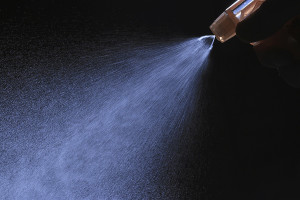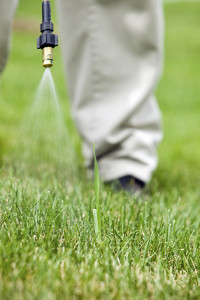Pesticide FAQs
We all know how confusing the legislation is with regards to the use of professional pesticides. Hopefully, our last article cleared up (as much as it is possible) which authorities and governing bodies were supposed to do what. For this article, Alice Northrop answers some frequently asked questions about professional pesticides and their use

Plant protection products (PPPs) form a wide group of products including fungicides, herbicides, insecticides and growth regulators.
What were the "Grandfather Rights", and how have the rules changed?
Up until 26th November 2015, an exemption in UK law, commonly known as "grandfather rights", allowed anyone born before 31 December 1964 to use plant protection products (PPPs) authorised for professional use on their own or their employer's land, without having to hold a certificate (of competence). Although they should still have been suitably trained and competent for their job.
The Plant Protection Products (Sustainable Use) Regulations 2012 allowed this exemption to continue until 26 November 2015, after which everyone who uses PPPs authorised for professional use must have a certificate.
In addition, after 26 November 2015, it is an offence for anyone to purchase PPPs authorised for professional use unless they have ensured that the intended end user has a certificate.
Can I use a professional product in a home/garden?
It is possible to use a professional pesticide in a home/garden setting, if the following criteria are met:
1. If a certificate of competence is needed, the user must possess one
2. The conditions of authorisation of the pesticide must be followed
3. The precautions and instructions given on the product label must be followed
As each situation is different, you may wish to contact the correct authorities to discuss your proposed use.
What does the law say about storing plant protection products?
Any professional user who stores plant protection products must ensure that all reasonable precautions are taken to protect human health and the environment. This includes ensuring that stores are constructed and maintained to a certain standard. HSE's agriculture information sheet number 16 sets out the appropriate standards for fixed and mobile stores.
It is illegal to store a plant protection product that does not have a valid authorisation, or cause or permit someone else to do so.
What is an Extension of authorisation for minor use?
Extensions of authorisation only apply to agricultural uses of pesticides and the user must accept any commercial risk from their use.
Extensions of authorisation may not be listed on the product label.
There are two types:
1. The Long Term Arrangements for Extension of Use (LTAUEs)
This is when HSE have made special arrangements to allow pesticides already authorised for use on one crop, to be used on similar crops without having to get another full authorisation. These arrangements are currently being phased out.
2. Extension of Authorisation for Minor Use (formerly known as Specific Off-label Approvals-SOLAS)
Users and authorisation holders of agricultural plant products may apply to have the authorisation of a specific product extended to cover additional uses to those shown on the product label. Any such Extensions of authorisation for Minor Use granted may have additional conditions attached to them.
Electronic copies of Extensions of Use can be obtained from the Chemical Regulation Directorate (CRD) website database.

You can search for your pesticide on the HSE's database of authorised pesticide products. The easiest way is to type in the MAPP Number, which can be found on the pesticide label. Otherwise, you can search the product name. If the pesticide has an authorisation, the database will show you the full details, including the expiry date.
The European Commission also provides a database of active substances currently and previously approved for use in the EU. To find the list, visit ec.europa.eu.
What to do if your product no longer has authorisation?
If your search results in no record of the product, that means the product is no longer authorised. If this is the case, you are obliged to dispose of it responsibly.
It is illegal to use or store any pesticide product that is no longer authorised.
Professional users will need to contact a specialist company that deals with these types of products. Amateur users should contact their local Civic Amenity site and ask them for guidance on disposal.
What are the certificates of competence needed to use PPPs?
Plant protection and pest control products need to be used legally, safely and competently. There are several courses with assessments that can be undertaken to gain your certificate of competence. To legally use PPPs, a PA1 theory foundation certificate must be attained, as well as an application module on the relevant form of application equipment that will be used by you.
For example, if you were going to be using a mounted sprayer, you must have gained the PA1 plus the PA2 for mounted sprayers certificates.
The PA1 module is assessed by computer based multiple choice questions.
PA2-13 are specific to the type of applicator being used (i.e. knapsack sprayer, boom sprayer, seed treatment). The assessment requires a practical demonstration of the candidate's competence for the application module being taken.
Underpinning knowledge and understanding will be assessed orally.
More information and courses can be found at www.groundsmantraining.co.uk, as well as www.nptc.org.uk.
How long does the certificate of competence last?
The City and Guilds NPTC certificates (as issued by Groundsman Training) last a lifetime. The team at Groundsman Training, however, recommend a refresher every 3-5 years.
Case studies
Groundsman Training received a query about the need for a certificate for the use of professional pesticides on his own land. "I only have a few livestock, and it's my own land. I don't think I need a certificate."
The truth is, if this man was going to be using PPPs, whether on his own land or on somebody else's, he is legally required to have a certificate of competence for the method of application he will be using.
The HSE states: "Anyone who uses a professional pesticide product should not use that pesticide or give instruction to others on its use unless they have received adequate instruction, training and guidance in its correct use."
"If I have spraying certificates, but my employee doesn't, can they use PPPs?"
Not unless they have a certificate of competence themselves. Anybody who uses PPPs must have a certificate of competence.
"I have been spraying pesticides for many years without a certificate, nothing has happened before. Why should I have a certificate of competence?"
Anybody who sprays PPPs must have a certificate of competence. If anything were to go wrong, or if you were reported in any way, you would be asked to provide your certificates. If you failed to provide these, legal action would be taken.
As well as this, without the relevant training, you may be unaware of the danger of some of the compounds that form pesticides, which can result in severe damage to the environment and the health of yourself and others.
